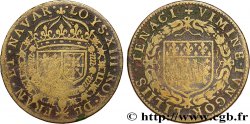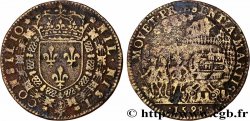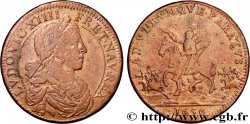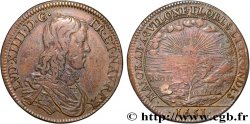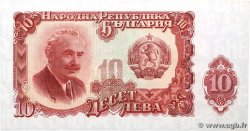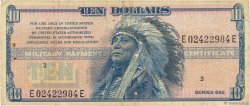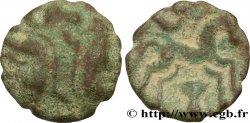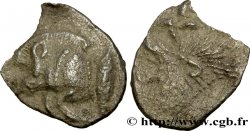E-auction 105-55204 - fjt_013992 - PICARDY - GENTRY AND TOWNS Charles, marquis, puis duc de La Vieuville 1623
You must signin and be an approved bidder to bid, LOGIN TO BID. Accounts are subject to approval and the approval process takes place within 48 hours. Do not wait until the day a sale closes to register. Clicking on « bid » constitutes acceptance of the terms of use of cgb.fr private e-auctions.
Bids must be placed in whole Euro amounts only. The sale will start closing at the time stated on the item description; any bids received at the site after the closing time will not be executed. Transmission times may vary and bids could be rejected if you wait until the last second. For further information ckeck the E-auctions F.A.Q.
NO BUYER'S FEE.
NO BUYER'S FEE.
| Estimate : | 120 € |
| Price : | 82 € |
| Maximum bid : | 104 € |
| End of the sale : | 20 April 2015 15:18:30 |
| bidders : | 7 bidders |
Type : Charles, marquis, puis duc de La Vieuville
Date: 1623
Metal : brass
Diameter : 27,5 mm
Orientation dies : 6 h.
Edge : lisse
Rarity : R2
Catalogue references :
F. - Corre.2759
Obverse
Obverse legend : CHARL MARQ D LA VIEVVILLE.
Obverse description : Armes de Charles de la Vieuville.
Reverse
Reverse legend : FATO PRVDENTIA MAIOR 1623.
Reverse description : Serpent autour d'une étoile.
Reverse translation : Sa prudence est plus grande que le destin.
Commentary
Charles, marquis, puis duc de La Vieuville (Paris vers 1582 - Paris 2 janvier 1653) était le fils de Robert de la Vieuville, petit-fils de Pierre de la Vieuville. D'abord homme de guerre, il est nommé en 1623 surintendant des Finances. Il fait entrer alors Richelieu au Conseil du roi et disgracier Sillery.
En 1624, il est arrêté le 13 août, pour prévarication sur ordre de Richelieu. Il s'évade du château d'Amboise, au bout d'un an (ou en 1631[1]) et se réfugie en Angleterre. Il est alors en disgrâce, et ce jusqu'à la mort de Richelieu.
Le 8 septembre 1651, il redevient surintendant des Finances et est fait duc et pair. Retz parle alors du "vieux bonhomme La Vieuville"[2] Il meurt deux ans plus tard. Voir l’article http://fr.wikipedia.org/wiki/Charles_de_La_Vieuville
Très intéressante étude du Ministère des Finances sur notre personnage à http://www.comite-histoire.minefi.gouv.fr/recherches_finances/les_hommes/controleurs_generaux/xviie_siecle/charles_de_la_vieuvi
Wikipedia consacre une notice à son château à http://fr.wikipedia.org/wiki/Ch%C3%A2teau_de_Chailvet.
Charles, Marquis, then Duke of La Vieuville (Paris around 1582 - Paris January 2, 1653) was the son of Robert de la Vieuville, grandson of Pierre de la Vieuville. Initially a warrior, he was appointed Superintendent of Finances in 1623. He then brought Richelieu into the King's Council and disgraced Sillery. In 1624, he was arrested on August 13, for prevarication on Richelieu's orders. He escaped from the Château d'Amboise after a year (or in 1631[1]) and took refuge in England. He was then in disgrace, and remained so until Richelieu's death. On September 8, 1651, he became Superintendent of Finances again and was made Duke and Peer. Retz then spoke of \\\"the old fellow La Vieuville\\\"[2] He died two years later. See the article http://fr.wikipedia.org/wiki/Charles_de_La_Vieuville Very interesting study by the Ministry of Finance on our character at http://www.comite-histoire.minefi.gouv.fr/recherches_finances/les_hommes/controleurs_generaux/xviie_siecle/charles_de_la_vieuvi Wikipedia devotes a notice to his castle at http://fr.wikipedia.org/wiki/Ch%C3%A2teau_de_Chailvet
En 1624, il est arrêté le 13 août, pour prévarication sur ordre de Richelieu. Il s'évade du château d'Amboise, au bout d'un an (ou en 1631[1]) et se réfugie en Angleterre. Il est alors en disgrâce, et ce jusqu'à la mort de Richelieu.
Le 8 septembre 1651, il redevient surintendant des Finances et est fait duc et pair. Retz parle alors du "vieux bonhomme La Vieuville"[2] Il meurt deux ans plus tard. Voir l’article http://fr.wikipedia.org/wiki/Charles_de_La_Vieuville
Très intéressante étude du Ministère des Finances sur notre personnage à http://www.comite-histoire.minefi.gouv.fr/recherches_finances/les_hommes/controleurs_generaux/xviie_siecle/charles_de_la_vieuvi
Wikipedia consacre une notice à son château à http://fr.wikipedia.org/wiki/Ch%C3%A2teau_de_Chailvet.
Charles, Marquis, then Duke of La Vieuville (Paris around 1582 - Paris January 2, 1653) was the son of Robert de la Vieuville, grandson of Pierre de la Vieuville. Initially a warrior, he was appointed Superintendent of Finances in 1623. He then brought Richelieu into the King's Council and disgraced Sillery. In 1624, he was arrested on August 13, for prevarication on Richelieu's orders. He escaped from the Château d'Amboise after a year (or in 1631[1]) and took refuge in England. He was then in disgrace, and remained so until Richelieu's death. On September 8, 1651, he became Superintendent of Finances again and was made Duke and Peer. Retz then spoke of \\\"the old fellow La Vieuville\\\"[2] He died two years later. See the article http://fr.wikipedia.org/wiki/Charles_de_La_Vieuville Very interesting study by the Ministry of Finance on our character at http://www.comite-histoire.minefi.gouv.fr/recherches_finances/les_hommes/controleurs_generaux/xviie_siecle/charles_de_la_vieuvi Wikipedia devotes a notice to his castle at http://fr.wikipedia.org/wiki/Ch%C3%A2teau_de_Chailvet







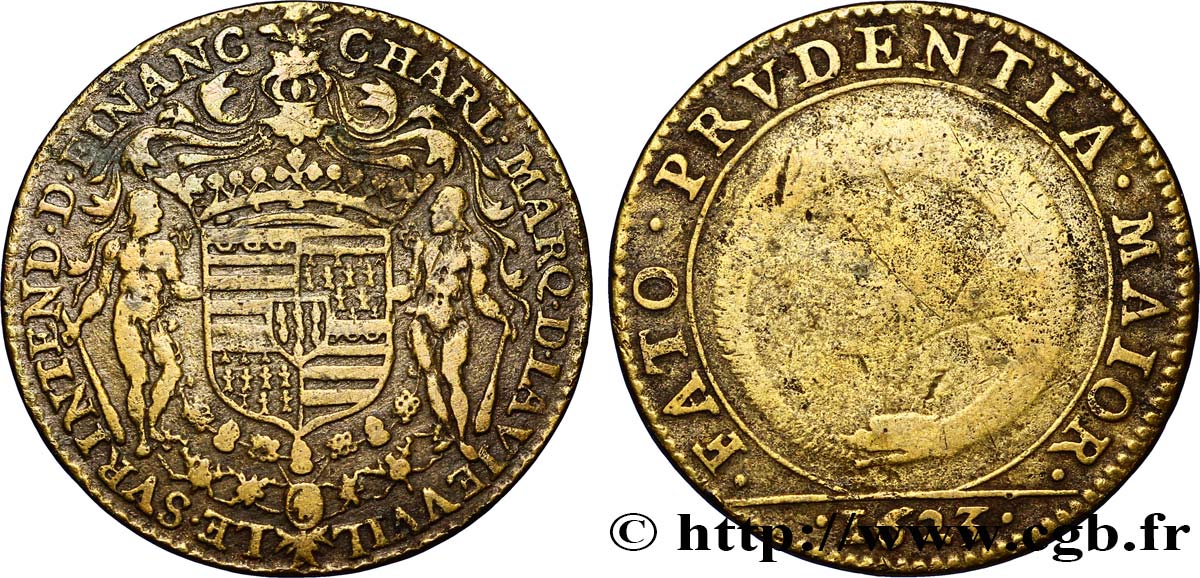
 Report a mistake
Report a mistake Print the page
Print the page Share my selection
Share my selection Ask a question
Ask a question Consign / sell
Consign / sell
 Full data
Full data